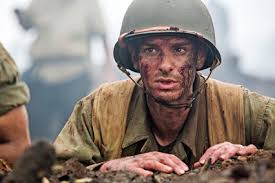
You can’t talk about “Hacksaw Ridge” without first addressing The Mel Gibson Question. He directed the movie, so his past has to be part of the discussion — particularly the anti-Semitic and misogynistic words he spewed a decade ago that, along with charges of domestic violence against his girlfriend, left him a pariah in Hollywood for awhile. He deserved every bit of scorn, but now the question is can those incidents be overlooked? Should the consequences of his words and actions in the past extend to him in the present and future?
If you look at other celebrities whose careers were affected by their bad deeds, you get a mixed message:
- Bill Cosby’s career has been ended by dozens of women accusing him of rape and sexual assault;
- I’ve avoided Tom Cruise movies after seeing the Scientology documentary “Going Clear”;
- Michael Richards hasn’t worked since his racist tirade at a comedy club;
- Isaiah Washington lost his job on “Grey’s Anatomy” for homophobic slurs about a co-star;
- Charlie Sheen lost a sitcom over his public meltdown and (yes, again) accusations of domestic violence, but returned a couple years later with another one;
- On the other hand, Michael Jackson’s music still gets plenty of airtime despite the child molestation charges.
As for Gibson, you’ll have to make up your own mind whether his past sins prevent you from spending your money on any of his projects. But I will tell you that “Hacksaw Ridge” is one hell of a war movie.
It’s the story of Desmond Doss, who wanted to be part of the military effort during World War II, but because he was raised an extremely religious Seventh Day Adventist, he couldn’t touch a gun, let alone carry one into battle. Still, he volunteered for the Army. When he couldn’t complete basic training because he refused to fire a weapon, he was court-martialed, but the authorities relented, accepted his position as a Conscientious Objector, and allowed him to become a battlefield medic.
“Hacksaw Ridge” shows all of this backstory, along with Doss dealing with an abusive alcoholic father, falling in love, and getting married before shipping off to the Pacific with his fellow soldiers. But it’s not until the platoon gets to Okinawa that the movie gets really intense. That’s where the real fight begins, with Americans trying to scale and take the title piece of land that’s occupied by Japanese soldiers. The battle scenes that take place there are the most intense war footage I’ve seen since the opening 25 minutes of “Saving Private Ryan.” It’s riveting, scary, bloody, and very well done.
Andrew Garfield adopts just the right tone as Doss, who went up that ridge with his colleagues and saved dozens of their lives when bullets and bombs tore into their bodies. Vince Vaughn is there, too, but (fortunately) he’s scaled back his usual scenery-chewing to portray a drill sergeant with just the right touch of R. Lee Ermey gruffness from “Full Metal Jacket.”
At the end of “Hacksaw Ridge,” you’ll see footage of the real-life Doss, who became the first Conscientious Objector to be awarded the Medal Of Honor. At just over two hours, it’s a little bit long because too much time is spent on the backstory, but it’s a truly compelling tale for which Gibson deserves major kudos.
The film cost $45 million and brought in a third of that in its opening weekend, with an 86% positive rating on Rotten Tomatoes. It’ll be interesting to see if the word of mouth helps business, or if Gibson’s history keeps audiences away in the next few weeks.
As for me, I give “Hacksaw Ridge” an 8.5 out of 10, with the warning that the intensity of the battle scenes may be too much for some people.
